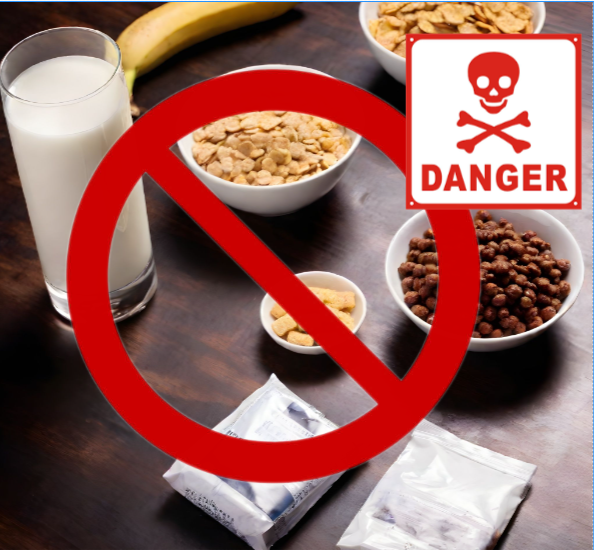We’ve all heard about the dangers of sugar. It’s been labeled as a poison by health experts due to its detrimental effects on our bodies. But did you know there’s a carbohydrate that might be even more dangerous than sugar, lurking in the everyday foods you consume? It’s present in breakfast cereals, protein bars, soups, and even baby formula—foods we often consider healthy.
In this blog post, we’ll uncover the hidden risks associated with this silent killer carbohydrate, why it’s more dangerous than sugar, and how you can avoid it to protect your health.
The Hidden Threat: Maltodextrin
What is Maltodextrin?
Maltodextrin is a highly processed carbohydrate that is often used as a thickener or filler in a wide range of packaged foods. Despite being derived from starch (such as corn, rice, or wheat), maltodextrin undergoes a heavy processing method that strips away any nutritional value, leaving behind a substance that can spike your blood sugar levels more rapidly than table sugar.
Why Maltodextrin is Dangerous
While sugar is notorious for raising blood sugar levels and contributing to weight gain, maltodextrin takes it a step further. With a glycemic index of 125, compared to table sugar’s 60-65, maltodextrin spikes blood sugar levels at almost double the rate. This rapid increase can lead to insulin resistance, weight gain, and a host of related health problems, such as diabetes and chronic inflammation.
Moreover, maltodextrin is often used in foods that are marketed as “healthy,” deceiving consumers who are trying to make better dietary choices. From protein bars to low-calorie snacks, this hidden ingredient is sabotaging your efforts to stay healthy.
The Bacterial Imbalance: How Maltodextrin Harms Your Gut

Understanding Gut Bacteria
Our bodies are home to trillions of bacteria, with a significant portion residing in our gut. These bacteria are crucial for our overall health, influencing everything from digestion to immune function. A balanced gut microbiome—where good bacteria outnumber bad bacteria—is essential for maintaining optimal health.
The Impact of Maltodextrin on Gut Health
Maltodextrin disrupts this balance by feeding harmful bacteria in the gut, such as Salmonella and E. coli, while simultaneously reducing the population of beneficial bacteria. This imbalance can lead to various health issues, including digestive disorders, weakened immunity, and even increased susceptibility to chronic diseases.
The connection between gut health and overall wellness is profound. Research has shown that an imbalance in gut bacteria can affect everything from weight gain to mental health, making it clear that maltodextrin’s impact on your gut is a serious concern.
The Misunderstood Sugar: Fructose
What is Fructose?
Fructose is a type of sugar naturally found in fruits, and it’s also commonly used in the form of high fructose corn syrup (HFCS) in many processed foods. While fruits contain beneficial nutrients like fiber and vitamins, HFCS in processed foods is a different story. It’s often added to sweeten sodas, candies, and snacks, contributing to excessive calorie intake without any nutritional benefits.
Why Fructose is Problematic
Fructose is often marketed as a “healthier” alternative to glucose due to its lower glycemic index. However, this is misleading. Unlike glucose, which the body uses as a primary energy source, fructose is metabolized differently. It bypasses the body’s insulin regulatory system, leading to fat storage in the liver and contributing to insulin resistance.
Additionally, fructose is particularly problematic because it doesn’t trigger the feeling of fullness, leading to overeating. This is one reason why HFCS is so prevalent in processed foods—its addictive nature keeps consumers coming back for more, contributing to the obesity epidemic.
The Double-Edged Sword: The Effects of Fructose on Health
The Connection to Obesity
Fructose’s role in weight gain is well-documented. Its ability to increase hunger-regulating hormones, like ghrelin, while blocking satiety signals, like leptin, makes it a major contributor to overeating and fat accumulation. Over time, this leads to weight gain, obesity, and associated health problems, such as type 2 diabetes and cardiovascular disease.
Fructose and Metabolic Health
Fructose not only contributes to weight gain but also increases the risk of metabolic disorders. Studies have shown that high fructose intake can lead to insulin resistance, which is a precursor to type 2 diabetes. Additionally, fructose has been linked to higher levels of bad cholesterol (LDL), further increasing the risk of heart disease.
Balancing the Diet: Should You Avoid Fruits?
The Role of Fruits in a Healthy Diet
Despite the concerns about fructose, it’s important to differentiate between the fructose found in whole fruits and that in processed foods. Whole fruits contain fiber, vitamins, minerals, and antioxidants that help mitigate the negative effects of fructose. Eating fruits in moderation as part of a balanced diet is beneficial and should not be avoided.
The Real Culprit: Processed Foods
The main issue lies in the excessive consumption of fructose from processed foods, not from whole fruits. Processed foods with added sugars, such as HFCS, should be limited to reduce the risk of obesity, diabetes, and other health problems. By focusing on whole, unprocessed foods, you can enjoy the benefits of fruits without the risks associated with fructose overload.
Conclusion: Protecting Your Health
In today’s world, hidden sugars and processed carbohydrates like maltodextrin and high fructose corn syrup are silently wreaking havoc on our health. These ingredients are found in many everyday foods and contribute to serious health problems, including obesity, diabetes, and gut health issues.
Awareness is the first step to protecting yourself. By reading labels, avoiding processed foods, and choosing whole, natural foods, you can minimize your exposure to these harmful carbohydrates and maintain a healthier lifestyle. Remember, moderation is key—enjoy fruits in their natural form, but be wary of the hidden dangers in processed foods.
sources for Information – Medical News today

